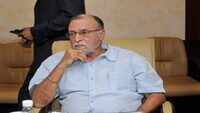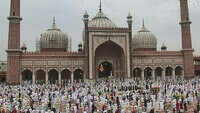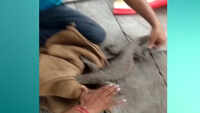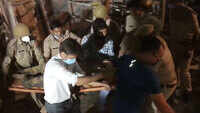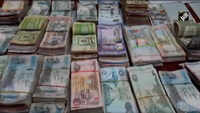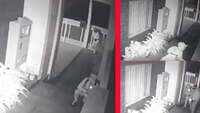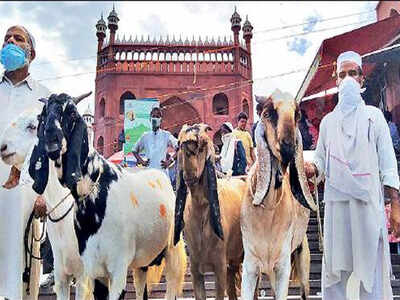
NEW DELHI: A day before Eid ul Adha, old Delhi was remarkably free of the festive crowd. Unlike at Eid Ul Fitr during the peak of the Covid-19 lockdown, there are more leniencies allowed to shoppers now, yet few from the Muslim community ventured out on Friday. And most of those who did went out hoping for last-minute bargain deals with goat sellers.
Mohammad Alam, owner of Babu Hotel, a small eatery on Urdu Bazar Road, had managed such a deal. But he bought only two goats instead of the six or seven he usually brought home to be sacrificed on Eid ul Adha every year. “The situation is dire and not many anyway can afford to spend big sums this year,” the 38-year-old explained. “The fear of the coronavirus has prompted many to eschew Eid celebrations.”
Near Meena Bazar, Mohammad Faiz, 14, of Pilibhit, UP, was desperately trying to find buyers for his goats. “We brought over 20 to Delhi, but still have five goats unsold despite my father and I having walked across old Delhi and offering them at a discount,” the youngster said.
Asif Iqbal and Amit Kumar were innovative. With households wary of going to the mandis to get their sacrificial lambs, Iqbal, owner of MS Farms in Rajasthan, chose instead to employ the power of social media to sell his animals. “We uploaded pictures and videos on our Facebook page and once customers opted for their choices, the sales took place via video calls and we delivered the goats to their homes,” said Iqbal, who took care to disinfect the shaggy coats of the goats before delivery. Kumar’s preferred platform was YouTube and he followed a similar protocol to sell his goats, offering his customers a decent price and small pickup vans to transport them.
The purchase of goats is a family custom during the festival. Kucha Chalan resident Nazimuddin, 42, said, “Every day, my kids have been asking me about the goats. My younger son even blabbers about goats in his sleep.” The hardware store owner was forced to go goat shopping on Friday. “I have to,” he said, “because as a father, I want my children to be happy.”
But the sacrificial offerings are also about charity. So for those who could not afford the goats this year, data engineer Faiz Ilahi started the Kheedmat Trust. “We request families to donate Rs 5,000. With the money we buy goats and distribute the meat among the waste collectors and poor residents of slums in Okhla. This allows people to fulfil their Eid obligation of charity.”
Unlike at Eid Ul Fitr, the faithful can congregate at mosques for prayers on Saturday. However, Jama Masjid’s Imam Bukhari asked the people to be careful. “Come to pray, but armed with masks and hand sanitisers,” he urged them.
Overall, however, the festive spirit is not as ebullient as usual. Mohammad Shan, co-owner of the popular Kallan Sweets at Jama Masjid, will open his shop at 6am on Eid Ul Adha but doesn’t hope for good business. “People have no money to spend, so we will not make a lot of sweets to sell,” he said
Fareed, owner of Matia Mahal’s Kamaal Sweets, was similarly pragmatic. As his employees fried kachoris, Fareed said, “I am not optimistic about business over the three days of Eid because families are not too keen on celebrations in these circumstances.” The slight congestion at Chitli Qabar did not enthuse traders either. A subdued bangle seller Abdul Malik muttered, “There is a crowd but no customers. This is the saddest Eid, devoid of the normal ronak.”
Mohammad Alam, owner of Babu Hotel, a small eatery on Urdu Bazar Road, had managed such a deal. But he bought only two goats instead of the six or seven he usually brought home to be sacrificed on Eid ul Adha every year. “The situation is dire and not many anyway can afford to spend big sums this year,” the 38-year-old explained. “The fear of the coronavirus has prompted many to eschew Eid celebrations.”
Near Meena Bazar, Mohammad Faiz, 14, of Pilibhit, UP, was desperately trying to find buyers for his goats. “We brought over 20 to Delhi, but still have five goats unsold despite my father and I having walked across old Delhi and offering them at a discount,” the youngster said.
Asif Iqbal and Amit Kumar were innovative. With households wary of going to the mandis to get their sacrificial lambs, Iqbal, owner of MS Farms in Rajasthan, chose instead to employ the power of social media to sell his animals. “We uploaded pictures and videos on our Facebook page and once customers opted for their choices, the sales took place via video calls and we delivered the goats to their homes,” said Iqbal, who took care to disinfect the shaggy coats of the goats before delivery. Kumar’s preferred platform was YouTube and he followed a similar protocol to sell his goats, offering his customers a decent price and small pickup vans to transport them.
The purchase of goats is a family custom during the festival. Kucha Chalan resident Nazimuddin, 42, said, “Every day, my kids have been asking me about the goats. My younger son even blabbers about goats in his sleep.” The hardware store owner was forced to go goat shopping on Friday. “I have to,” he said, “because as a father, I want my children to be happy.”
But the sacrificial offerings are also about charity. So for those who could not afford the goats this year, data engineer Faiz Ilahi started the Kheedmat Trust. “We request families to donate Rs 5,000. With the money we buy goats and distribute the meat among the waste collectors and poor residents of slums in Okhla. This allows people to fulfil their Eid obligation of charity.”
Unlike at Eid Ul Fitr, the faithful can congregate at mosques for prayers on Saturday. However, Jama Masjid’s Imam Bukhari asked the people to be careful. “Come to pray, but armed with masks and hand sanitisers,” he urged them.
Overall, however, the festive spirit is not as ebullient as usual. Mohammad Shan, co-owner of the popular Kallan Sweets at Jama Masjid, will open his shop at 6am on Eid Ul Adha but doesn’t hope for good business. “People have no money to spend, so we will not make a lot of sweets to sell,” he said
Fareed, owner of Matia Mahal’s Kamaal Sweets, was similarly pragmatic. As his employees fried kachoris, Fareed said, “I am not optimistic about business over the three days of Eid because families are not too keen on celebrations in these circumstances.” The slight congestion at Chitli Qabar did not enthuse traders either. A subdued bangle seller Abdul Malik muttered, “There is a crowd but no customers. This is the saddest Eid, devoid of the normal ronak.”

Coronavirus outbreak
Trending Topics
LATEST VIDEOS
More from TOI
Navbharat Times
Featured Today in Travel
Get the app
